Over eleven million Americans will buy kosher food this year, according to LUBICOM, a marketing and consulting group for kosher interests. Up from six million in 1990, the trend represents an explosion of kashrut consciousness across the United States. Of this figure, one million Jews and three million Muslims consume kosher for religious reasons, while the rest do so believing that they are getting higher quality products. But despite the widespread prevalence of kosher food, confusion abounds as to what exactly makes something kosher.
Combating that ignorance, Chabad Lubavitch has been campaigning since 1975 to educate and encourage the observance of kashrut laws. The response has been tremendous, with many Jewish families inviting their local Chabad representatives to convert their kitchens to kosher – sometimes even bringing blowtorches in to "kasher" the counters and stoves. Responding to the multitudes of Jews taking on kashrut observance, the market has flooded with kosher products. LUBICOM reports 98,000 certified kosher products. The average number of kosher products in supermarkets are a groundbreaking 17,000.
Many people know that pork isn’t kosher, but the laws of kashrut are far more complex. Only animals that both have split hooves and that chew their cud can possibly become kosher, and this only after being slaughtered by a trained shochet. The procedure does not involve the superficial blessing of food that many imagine Rabbis perform, but rather the application of complex laws to ensure the food meets the Torah’s standards.
Because the consumer committed to a kosher lifestyle can’t personally check each of the 10,000 kosher producing companies and plants in the United States, they rely on the word of a mashgiach, a Rabbi trained to supervise the kashrut process. Their job is to prevent the kind of scandal that recently emerged in a Jewish community when consumers found that a specific butcher shop was repackaging non-kosher meat, and selling it as kosher.
Many supervisors have their own logos that they affix to products to affirm their kashrut. Symbols like the OK and the OU are well known, but frequently consumers are challenged to determine whether dozens of smaller organizations meet their standard of kashrut. This problem affects both the Jewish and Muslim communities, who are concerned with kosher and halal food respectively. Both religions have similar, though not identical, dietary restrictions. Recently, this shared concern about proper labeling lead to an unlikely coalition between the Orthodox Jewish and Muslim communities of Northern Virginia.
"It was the result of bipartisan legislative effort and the Jewish and Muslim communities worked closely together on the legislative as well," Governor Tim Kaine, who signed on the bill, told Lubavitch.com.
The bill, the first joint kosher-halal labeling law in the United States, replaced an older statute that required all kosher symbols to attest that the food had " been prepared under the Orthodox Hebrew religious requirements." The former law had been defeated in other State legislation, such as New Jersey’s, as unconstitutional. The effort to push the new one, which requires kosher seals to advertise who gave the supervision, was a constitutional way to ensure the public was kept knowledgeable.
Rabbi Sholom B. Deitsch, the director of Chabad Lubavitch of Northern Virginia, pushed the bill while it was in its infancy. A local store claimed to be kosher, though they mixed milk with meat and were open of Shabbat. He had hoped the law would keep them from falsely representing themselves. Though the law doesn’t strip them of the right to call themselves kosher, it does now require them to disclose their supervision.
"You have the right to know what you are eating, but the government should not be able to say what is kosher," Rabbi Leibel Fajnland of Chabad Lubavitch of Northern Virginia, said. The new bill reads, in part, that it is "unlawful to label any repackaged food that represents the food as kosher or halal without indicating the person authorizing such designation."
The kosher outreach division of Chabad-Lubavitch declined to comment about the Virginia Kosher-Halal bill, but Mrs. Sterna Zirkind, who is involved in Chabad of New York kosher outreach, told Lubavitch.com an anecdote that spoke to the story.
"I was on a flight recently, and this particular airline didn’t have special meals on certain legs of their flight," Zirkind said. "And they said they decided they can have either regular or vegetarian – not kosher or halal. I explained to them that if someone is kosher, it has nothing to do with whether it’s vegetarian or not. And they made a comment that Muslims told them the same thing. I inferred from there that Muslims must feel kosher standards are similar to theirs. What you’re telling me fits in with that. There are similar concerns and needs when it comes to kashrut for the kosher consumer and the religious Muslim."
Ironically, Menachem Lubinsky, editor of the magazine Kosher Today, commented to Lubavitch.com from 37,000 feet off the ground, on a trip to Israel: "The Jewish community has traditionally worked with any strategic partners to assure that consumers who wish to observe kashrus are protected from any type of fraud in the marketplace." "To the extent that other groups like advocates for Halal share that interest, we are always pleased to join in any legislative cooperative effort."

Be the first to write a comment.